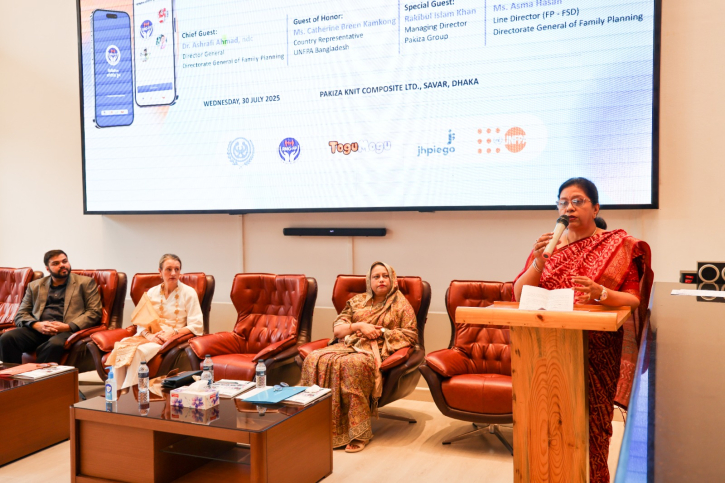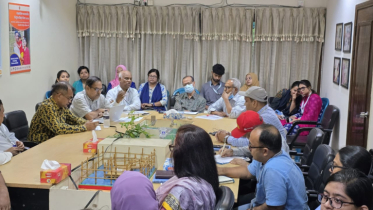
The tool will reach 22 thousands women across six factories within a year through collaborative efforts of national health partners, private sector, and UNFPA.
The Directorate General of Family Planning (DGFP), in collaboration with the United Nations Population Fund (UNFPA) and key private sector partners, have launched the Digital Monitoring Tool (DMT) today to ensure more accurate and demand responsive contraceptive distribution right to the user in Bangladesh’s readymade garment sector.
The launch will ensure smart, scalable, and accountable family planning service delivery, directly benefiting around 22 thousands women in six participating garment factories in its initial year.
The Digital Monitoring Tool is a dual-platform system that enables real-time data collection for improved forecasting and supply, stock visibility, usage tracking, and performance review across factory health centres. Developed with technical support from ToguMogu Private Limited and Jhpiego, it addresses the limitations of paper-based systems that often result in supply chain disruptions and stock outs which limit women's choices of contraceptives and impact women's health.
Speaking at the launch, Catherine Breen Kamkong, UNFPA Representative in Bangladesh, emphasized the urgency of reaching women with efficient reproductive health solutions which address their rights and needs to access quality and affordable services.
“This tool brings services closer to the women who power Bangladesh’s economy. This innovation is about more than technology. It is about ensuring workers’ rights to SRH are fulfilled and that they are supported with enabling conditions in the workplace. It ensures workers are supported not just as patients, but as professionals contributing to Bangladesh’s growth,” said Catherine Breen Kamkong.
Bangladesh’s RMG sector employs over four million workers, the vast majority of whom are women. Yet, many continue to face challenges in accessing affordable and reliable family planning and sexual and reproductive health services. A recent UNFPA study in six RMG factories found that investing in family planning yields remarkable returns: up to 20% increase in productivity, 26% reduction in absenteeism, and savings of up to USD 160,000 annually per factory.
Over the past nine years, only 804,000 female RMG workers were able to access contraceptives through existing channels—covering just a fraction of the workforce. With the tool, DGFP aims to better meet the demands of women who work in factories for these services and scale up access while ensuring transparency and efficiency in service delivery.
The initiative is part of a broader strategy by UNFPA and the DGFP to expand public-private partnerships to address the unmet need for modern contraceptives, currently at 12%, and to enhance integrated sexual and reproductive health services, including cervical cancer screening and gender-based violence response.
“This milestone marks more than just the launch of an innovative technology—it is a reaffirmation of the Government’s unwavering commitment to investing in the people who are the backbone of our nation’s progress,” said Dr. Ashrafi Ahmad, ndc, Director General of the Directorate General of Family Planning, acknowledging the transformative potential of the tool.
“At Pakiza Knit Composite Ltd., our people are at the heart of everything we do. We care deeply about their well-being, which is why we invest in their health. A healthy workforce is a resilient and motivated one—fueling productivity and helping us set new benchmarks in the RMG industry," said Rakibul Islam Khan, Managing Director of Pakiza Knit Composite Ltd., said.
Following today’s launch, the DMT will continue to be rolled out and refined based on user feedback. The next six months will focus on full implementation in pilot sites, bulk data integration, performance reporting, and mobilizing support for national scale-up
TH

.png)







